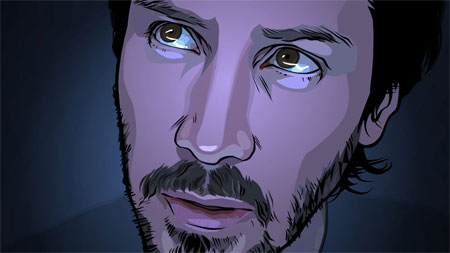A Scanner Darkly
September 09, 2006 ・ Blog

I went to see A Scanner Darkly last night. Embarrassingly (look, this is the sort of thing I get embarrassed about), I haven’t read the book it’s based on, but despite Philip K. Dick having written it nearly 30 years ago the film’s vision of the near future felt very relevant.
For brevity, these are some of the things I loved about it:
- Its prosaic near-futureness – the characters drive crappy cars and live in nowhere LA suburbs. It avoids gleaming modernity, instead focusing on the decaying or frozen legacies of the past.
- The rotoscoped visuals. I don’t think they’re a case of style over substance – they provide a perfect sense of surreal drug and brain damage induced disorientation.
- The rotoscoping also allows a wonderful extra dimension to the characters – Freck’s rubbery paranoia and the wild scattershot impulsiveness of Robert Downey Jr.’s Barris.
- The scramble suits look amazing.
- The mix of intrigue, humour and pathos – funny rambling conversations about bike gears and paranoid plans seamlessly blend into the situational horror of the main character, Agent Fred/Bob Arctor (played by Keanu Reeves, who, considering he’s Keanu Reeves, is pretty good).
I didn’t like everything, though. The end of the film feels divorced from the bulk of the narrative, with whole new elements hurriedly bought into play and concluded in a blur. Until this last section, A Scanner Darkly compellingly maintains a strong theme about surveillance and loss of identity, but the sudden change in direction ultimately muddies it, and I came out feeling much less satisfied and more than a little confused.
But the film certainly captures the dislocation of both a broken society and a broken personality while remaining highly entertaining. Two thumbs up.
And I promise to post more. Monthly ain’t enough.